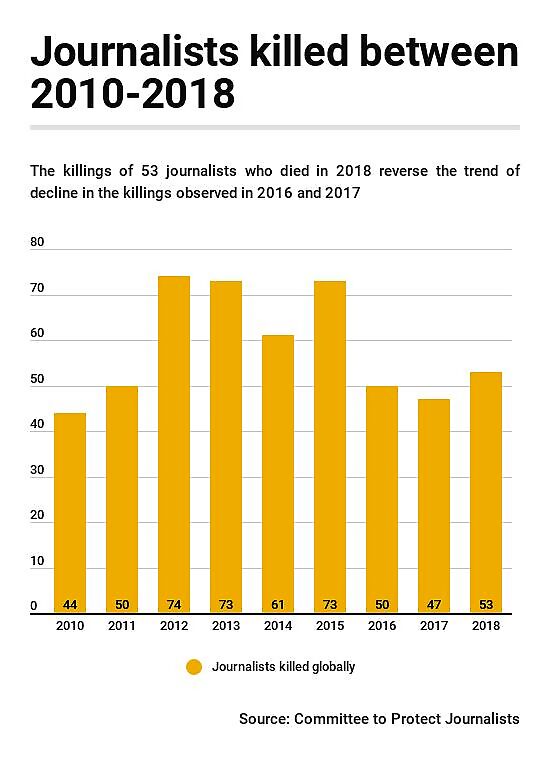
views
New Delhi: A moderate voice and an advocate of peace in militancy-hit Jammu and Kashmir, Rising Kashmir editor Shujaat Bukhari was killed by three bike-borne assailants on June 14 in Srinagar. He was shot dead by the gunmen around 7 pm on the eve of Eid-al Fitr outside his office in Srinagar’s Press Colony. Bukhari was one among many journalists in India and abroad to have lost their life in the line of duty last year.
According to Community to Protect Journalists (CPJ), an independent, non-profit organisation that promotes press freedom, at least five journalists were killed throughout the year in India, with four of them being singled targeted attacks. This includes Shujaat Bukhari, Chandan Tiwari, Navin Nischal and Sandeep Sharma. The fifth journalist, Achyutananda Sahu, a Doordarshan cameraperson, was killed in the crossfire between Naxals and security persons near Nilwaya village in Chhattisgarh.
Navin Nischal, a stringer for Dainik Bhaskar, was mowed down by an SUV in Bihar’s Arrah town on March 25 allegedly for his report on child marriage and the accused’s role in land divisions in the village. On the very next day, News World reporter Sandeep Sharma was killed in Madhya Pradesh’s Bhind when a truck ran over him while he was riding his bike to a government event. He was killed allegedly for reporting in 2017 on illegal sand mining and alleged police corruption. Chandan Tiwari was abducted and killed in October this year in Jharkhand, again for reporting on corruption.
It is amid this backdrop that the Union I&B minister Rajyavardhan Rathore told the Lok Sabha on December 20 that the government doesn’t have data on attacks on journalists in the country.
“National Crime Records Bureau (NCRB) has not published data on attacks in respect of separate categories of professionals, including journalists. However, information is being compiled,” he said.

The phenomenon of targeting journalists, however, was not just limited to India. Globally, too, as many as 53 journalists were killed between January 1, 2018 and December 14, 2018, as per CPJ data. This reversed the trend of a dip in journalist deaths that was seen in 2016 and 2017 when 50 and 47 journalists were killed on the job after a notorious high of 73 deaths in 2015. Out of these, CPJ suggests that at least 34 were specifically targeted for murder. The number increases to 60 when other media workers are included.
To put things into perspective, International Federation of Journalists (IFJ), another global body advocating press freedom, puts the number of killings at 94, which apart from journalists includes other mediapersons such as fixers and technicians. Yet another organisation, Reporters Without Borders (RSF), estimates that at least 80 journalists were killed worldwide.
Sixty-three professional journalists, 13 non-professional journalists and four media workers form part of RSF’s figure. The trend, however, remains the same that journalist deaths increased this year after a decline in the previous two years.
Probably the most covered or high-profile case was of The Washington Post columnist Jamal Khashoggi, who was killed in Saudi Arabia’s consulate in Istanbul in October by Saudi agents. Khashoggi, who was living in a self-imposed exile in the US, was a strong critic of Saudi Crown Prince Mohammad Bin Salman who allegedly ordered the killing as the CIA claimed that only he could have ordered such an act.
Apart from killings, imprisonment was yet another way to silence critical voices which left as many as 251 journalists around the world in jail. In India, the most recent one is the case of Kishorchandra Wangkhem, who was sentenced to a one-year detention by the authorities on December 21 under the National Security Act (NSA) for his social media posts criticising the prime minister and the RSS.
Another case is that of Kashmir Narrator’s Aasif Sultan, 31, who was arrested on August 27 by the Jammu and Kashmir Police over his “complicity for harbouring known terrorists involved in a series of terror crimes”, according to the police statement as reported by The Wire. Aasif, an assistant editor at his organisation, covers politics and has written several pieces on militancy in the state. Aasif is still in jail and has been denied bail by the authorities with global press freedom bodies such as CPJ, International Federation for Journalists (IFJ) and Reporters Without Borders condemning his detention. His family and organisation deny the charges levelled against him.
This was a year when cases such as the Khashoggi murder started widespread discussions all over the world about the rise in suppression of freedom of speech and threats to the lives of journalists. Time magazine recognised the issue and named as its Person of the Year: Jamal Khashoggi, The Capital Gazette in US where five journalists were killed in the newsroom by a gunman, Reuters reporters Wa Lone and Kyaw So Oo in Myanmar convicted for reporting Rohingya killings and Maria Ressa, an indicted Filipina journalist critical of President Roderigo Duterte. The magazine has titled the issue as ‘The Guardians and the war on truth’.




















Comments
0 comment